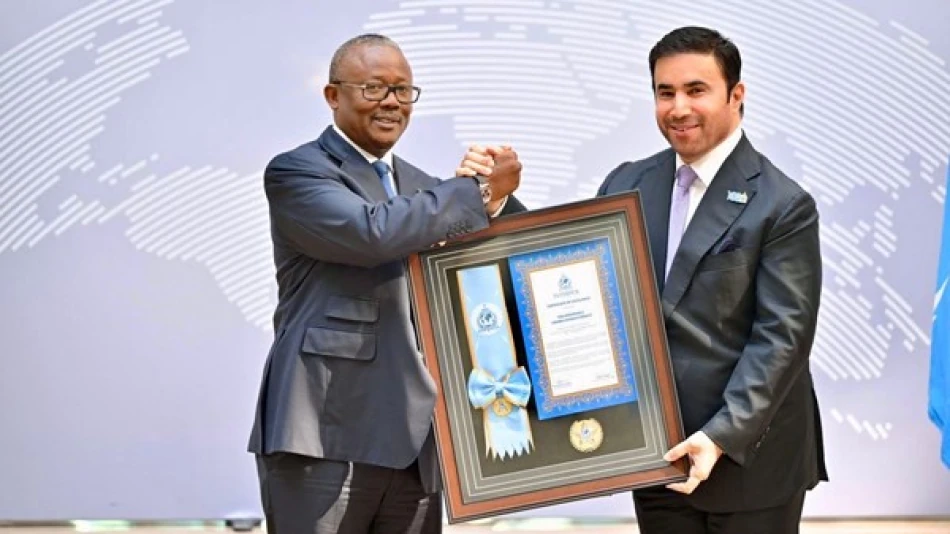
Guinea-Bissau President Receives Interpol's Highest Honor, Breaking 100-Year Barrier for African Leaders
Guinea-Bissau President Makes History as First African Leader to Receive Interpol's Highest Honor
In a groundbreaking moment for African representation in global security affairs, President Umaro Sissoco Embaló of Guinea-Bissau became the first African head of state to receive Interpol's highest distinction—the Upper Class Interpol Medal—during a historic visit to the organization's headquarters in Lyon. The ceremony marks not only a personal achievement but signals Africa's growing influence in international security cooperation at a time when transnational crime and cybersecurity threats demand unprecedented global coordination.
A Century-Long Wait Ends
Major General Dr. Ahmed Naser Al-Raisi, President of the International Criminal Police Organization (Interpol), presented the medal to President Embaló during what was also the first visit by any African head of state to Interpol's headquarters since the organization's founding over a century ago. This dual milestone underscores a significant shift in how international security institutions engage with African leadership.
The timing of this recognition reflects broader geopolitical trends. As European and North American nations grapple with migration-related security challenges, many of which originate from or pass through West Africa, partnerships with stable African governments have become increasingly strategic. Guinea-Bissau, despite its small size and economic challenges, sits at a crucial geographic crossroads for both legitimate trade and illicit trafficking routes.
Beyond Symbolism: Strategic Security Partnerships
Interpol's highest medal is reserved for leaders who demonstrate exceptional commitment to combating organized crime, terrorism, and cyber threats—areas where West Africa faces mounting pressures. The region has become a key transit point for South American cocaine destined for Europe, while also confronting growing threats from cyber criminals and terrorist networks expanding southward from the Sahel.
President Embaló's recognition suggests Guinea-Bissau has made meaningful contributions to regional security cooperation, likely including intelligence sharing, joint operations, or policy reforms that align with international standards. For a country that experienced political instability and was once labeled a "narco-state," this represents a remarkable transformation.
Market and Geopolitical Implications
From an investment perspective, this recognition could signal improved governance and rule of law in Guinea-Bissau, potentially making the country more attractive to international investors and development partners. Enhanced security cooperation often correlates with better business environments, as it demonstrates government capacity to enforce laws and maintain stability.
The broader implications extend to regional security markets and defense partnerships. As Western nations seek reliable partners for counter-terrorism and anti-trafficking efforts in West Africa, countries that demonstrate strong institutional cooperation with organizations like Interpol gain strategic value. This could translate into increased security assistance, training programs, and technology transfers.
Africa's Rising Security Profile
President Embaló framed the honor as recognition for the entire continent, stating that the medal represents "tribute to Africa and its pivotal role in protecting global security and stability." This reflects a broader narrative shift where African nations are positioning themselves as essential partners rather than passive recipients of security assistance.
The ceremony comes as African nations increasingly assert their importance in global security architecture. From Somalia's counter-terrorism efforts to Nigeria's cybersecurity initiatives, the continent is moving beyond being viewed merely as a source of security challenges to being recognized as part of the solution.
Looking Forward: Precedent and Expectations
This historic recognition sets a precedent that could encourage other African leaders to deepen their engagement with international security organizations. It also raises expectations for Guinea-Bissau to maintain and expand its security cooperation commitments.
For Interpol, honoring an African leader aligns with the organization's need to strengthen partnerships across all continents as crime becomes increasingly globalized. The 196-member organization recognizes that effective law enforcement requires genuine cooperation from every region, not just traditional Western allies.
The success of this partnership will likely be measured by concrete outcomes: reduced trafficking through Guinea-Bissau's territory, improved regional intelligence sharing, and enhanced capacity to address emerging cyber threats. If these materialize, President Embaló's recognition could mark the beginning of a new era of African leadership in global security governance.
Most Viewed News

 Layla Al Mansoori
Layla Al Mansoori






